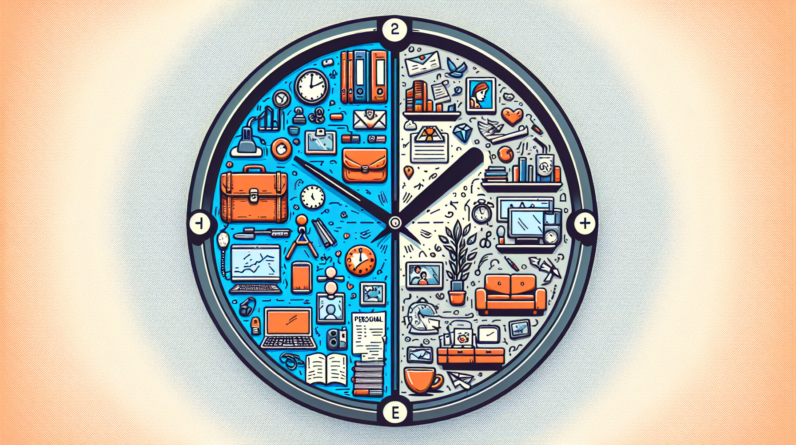In today’s fast-paced and tech-driven world, it can be challenging to find the balance between work and personal life. The constant connectivity and the pressure to always be available can often leave us feeling overwhelmed and exhausted. However, by creating boundaries and consciously unplugging from work, you can reclaim your personal time and restore a sense of balance in your life. This article explores the importance of setting limits, establishing boundaries, and the positive impact it can have on your overall well-being. Whether it’s setting specific work hours, designating device-free zones, or practicing mindfulness, taking the time to disconnect from work can be a powerful tool in achieving a more balanced and fulfilling life.

Understanding the Importance of Work-Life Balance
work-life balance is the key to maintaining a healthy and fulfilling lifestyle. It refers to the equilibrium between your professional and personal responsibilities, allowing you to effectively manage your work and still have time for activities you enjoy. Without a proper work-life balance, you may find yourself overwhelmed, stressed, and ultimately burnt out. Recognizing the negative impact of a lack of work-life balance is crucial in order to prioritize and make changes in your life.
Recognizing the negative impact of a lack of work-life balance
When your work-life balance is off-kilter, various negative consequences can arise. Your mental and physical health may suffer as stress levels increase, leading to feelings of exhaustion, anxiety, and even depression. Relationships with family and friends may deteriorate, as the time and energy you should invest in personal connections are instead consumed by work commitments. Additionally, when work encroaches heavily on your personal life, you may find yourself missing out on experiences and activities that bring you joy and fulfillment. Understanding the negative impact of a lack of work-life balance is the first step towards making positive changes.
Exploring the benefits of achieving work-life balance
Achieving a healthy work-life balance brings numerous benefits that extend beyond personal satisfaction. By effectively managing your time and energies, you will experience improved mental and physical well-being. Reduced stress levels can lead to increased productivity and creativity, allowing you to perform at your best in your professional life. Additionally, maintaining a healthy work-life balance enables you to cultivate stronger relationships, both personally and professionally. It allows for personal growth, self-reflection, and the pursuit of hobbies and activities that bring happiness and fulfillment. Ultimately, achieving work-life balance leads to a more harmonious and fulfilling existence.
Setting Clear Boundaries
In order to achieve work-life balance, it is essential to set clear boundaries between your professional and personal lives. By establishing these boundaries, you are able to define the amount of time and energy you are willing to dedicate to work and personal activities. Setting clear boundaries allows you to protect your personal time and prioritize self-care.
Defining your ideal work-life balance
Everyone’s ideal work-life balance will vary depending on their individual circumstances and priorities. Take the time to reflect on what makes you feel fulfilled and content in both your professional and personal life. Consider the hours you want to dedicate to work, personal activities, and self-care. Defining your ideal work-life balance helps you understand what areas of your life need attention and adjustment.
Identifying your non-negotiable boundaries
Once you have defined your ideal work-life balance, it is crucial to identify your non-negotiable boundaries. These are the aspects of your life that you are unwilling to compromise on and are essential for your well-being. It could be spending quality time with your family, pursuing personal hobbies, or simply having uninterrupted time for rest and relaxation. Identifying and clearly communicating these boundaries to yourself and others helps create a strong foundation for achieving work-life balance.
Establishing a Daily Routine
Establishing a daily routine is an effective way to maintain work-life balance and create structure in your life. By implementing designated work hours and setting aside dedicated time for personal activities, you can ensure that both areas of your life receive the attention they deserve.
Implementing designated work hours
One of the keys to work-life balance is to establish specific work hours to differentiate between work time and personal time. This means setting clear boundaries on when you are available for work-related tasks and when you are not. It could be a traditional 9-to-5 schedule or any schedule that fits your lifestyle. By sticking to these designated work hours, you can avoid the temptation to work late into the evening or on weekends, allowing for a better separation between work and personal life.
Creating dedicated time for personal activities
In addition to establishing work hours, it is equally important to create dedicated time for personal activities. This includes spending time with loved ones, pursuing hobbies, engaging in exercise or self-care practices, or simply enjoying leisure time. By intentionally allocating time for personal activities, you are actively prioritizing your own well-being and happiness. Building personal time into your daily routine helps to ensure that work does not consume your entire life, allowing for a more balanced and fulfilling existence.
Creating a Distraction-Free Environment
A distraction-free environment is essential for maintaining focus and productivity, enabling you to make the most of your work and personal time. By minimizing interruptions and utilizing technology to enhance focus, you can create an environment that supports your work-life balance goals.
Minimizing interruptions
Interruptions can significantly disrupt productivity and hinder work-life balance. It is important to identify and minimize potential distractions in your environment. This could involve turning off notifications on your phone, setting specific times for checking emails, or informing colleagues of your designated work hours and requesting that they respect your boundaries. By proactively reducing interruptions, you can create a space conducive to focus and concentration.
Utilizing technology to enhance focus
While technology can be a source of distractions, it can also be used to enhance focus and productivity when used intentionally. Various productivity tools and apps are available that can help you stay organized, manage your time effectively, and block out distractions. These include time management apps, website blockers, and productivity trackers. By leveraging technology to enhance focus, you can optimize your work efficiency, leaving more time for personal activities.

Setting Realistic Goals
Setting realistic goals is crucial in achieving work-life balance. By avoiding overcommitment and setting priorities, you can effectively manage your time and expectations in both your professional and personal life.
Avoiding overcommitment
Overcommitting yourself to tasks and responsibilities can lead to overwhelm and imbalance in both your work and personal life. It is important to assess and evaluate your capacity realistically. Be mindful of your limitations and learn to say no when necessary. By avoiding overcommitment, you can ensure that you have ample time and energy for both work and personal activities, maintaining a healthier work-life balance.
Setting priorities and managing expectations
In order to effectively manage your time and achieve work-life balance, it is crucial to set priorities and manage expectations, both for yourself and others. Identify the tasks and activities that are of highest importance and focus your efforts accordingly. Communicate your priorities and timelines to colleagues and loved ones, setting reasonable expectations for what you can accomplish. By setting clear priorities and managing expectations, you can avoid spreading yourself too thin and cultivate a better work-life balance.
Developing Effective Communication Habits
Effective communication is essential for maintaining work-life balance. By establishing clear communication channels and learning when and how to say ‘no,’ you can navigate your professional and personal life more seamlessly.
Establishing clear communication channels
Having clear lines of communication is paramount to managing work-life balance. This includes communicating your boundaries, expectations, and availability to colleagues, supervisors, and loved ones. Clearly express the times when you are and are not available for work-related matters. Establishing open and honest communication channels enables others to respect your boundaries and reduces the likelihood of work encroaching on your personal life.
Learning when and how to say ‘no’
Learning to say ‘no’ is a vital skill in achieving work-life balance. It is important to recognize your own limitations and establish boundaries around what you can reasonably handle. Politely declining tasks or commitments that would overwhelm you is not only essential for maintaining balance but also prevents burnout. By prioritizing your well-being and learning when and how to say ‘no,’ you can protect your personal time and prioritize self-care.

Delegating and Outsourcing Tasks
Delegating and outsourcing tasks can be highly beneficial in achieving work-life balance. By recognizing the importance of delegation and identifying tasks that can be outsourced, you can lighten your workload and create more time for personal activities.
Recognizing the importance of delegation
Delegating tasks is crucial to avoid becoming overwhelmed and overloaded with work. Assess the tasks on your plate and identify areas where you can involve others. Whether it’s delegating responsibilities to colleagues or outsourcing tasks to professionals, recognizing the importance of delegation allows you to free up your time for more pressing matters and personal activities. By effectively delegating, you can achieve a healthier work-life balance.
Identifying tasks that can be outsourced
In addition to delegation, outsourcing tasks can be a valuable strategy for achieving work-life balance. Identify tasks that do not require your specific expertise or can be done more efficiently by others. This might include administrative or repetitive tasks that can be outsourced to virtual assistants or contractors. By offloading these tasks, you can focus on more important and meaningful work, as well as carve out time for personal activities.
Implementing Self-Care Practices
Self-care plays a fundamental role in achieving and maintaining work-life balance. By prioritizing physical exercise and incorporating relaxation techniques into your routine, you can nurture your overall well-being.
Prioritizing physical exercise
Physical exercise is not only beneficial for your physical health but also plays a crucial role in maintaining mental well-being. Schedule regular exercise sessions that fit your lifestyle, whether it’s going for a run, attending a fitness class, or simply taking a walk. Prioritizing physical exercise allows you to recharge your energy levels, reduce stress, and improve focus. By taking care of your physical health, you are better equipped to balance the demands of work and personal life.
Incorporating relaxation techniques
In addition to physical exercise, incorporating relaxation techniques into your routine is essential for work-life balance. This can include mindfulness meditation, deep breathing exercises, or engaging in activities that help you relax and unwind, such as reading, listening to music, or spending time in nature. By practicing relaxation techniques, you can reduce stress levels, promote mental clarity, and create a sense of calm amidst the demands of daily life. Prioritizing relaxation allows for better focus and energy allocation in both your personal and professional endeavors.

Creating a Supportive Network
Surrounding yourself with like-minded individuals and seeking support from colleagues and mentors is invaluable in achieving work-life balance. By nurturing a supportive network, you can learn from others, share experiences, and gain valuable insights for maintaining a balanced lifestyle.
Surrounding yourself with like-minded individuals
Building a network of like-minded individuals who value work-life balance can provide a strong support system. Seek out friends, colleagues, or mentors who prioritize a balanced lifestyle and share similar goals. By connecting with individuals who understand the importance of work-life balance, you can exchange ideas, share experiences, and offer mutual support. Surrounding yourself with a supportive network fosters a healthier work-life balance.
Seeking support from colleagues and mentors
In addition to surrounding yourself with like-minded individuals, seeking support from colleagues and mentors can be instrumental in achieving work-life balance. Engage with colleagues who can offer guidance on managing workload or solutions for work-related challenges. Seek out mentors who have successfully achieved work-life balance and learn from their experiences. By leveraging the expertise and support of others, you can navigate the complexities of work and personal life more effectively, ultimately fostering a more harmonious existence.
Overcoming Guilt and FOMO
As you strive to achieve work-life balance, it is common to encounter feelings of guilt or the fear of missing out on work-related opportunities. Overcoming these emotions is essential in order to fully embrace and prioritize personal time.
Addressing feelings of guilt for prioritizing personal time
Prioritizing personal time can sometimes evoke feelings of guilt, especially when work demands are high or societal expectations place a heavy emphasis on productivity. It is important to address and challenge these feelings of guilt by recognizing that personal time is an essential component of overall well-being. Remember that by taking care of yourself and setting boundaries, you are better equipped to excel in your professional life. Adopt a mindset that prioritizing personal time is not selfish but necessary for a balanced and fulfilling life.
The fear of missing out on work-related opportunities can also be a challenge when striving for work-life balance. It is important to remember that balance does not equate to missed opportunities. By setting priorities and managing expectations, you can focus on the most meaningful and impactful opportunities, rather than trying to do everything. Embrace a mindset of abundance, knowing that by devoting time to personal activities, you are nurturing your overall well-being and creating a foundation for sustained success in both your personal and professional life.
In conclusion, achieving work-life balance is a journey that requires intentional effort and self-reflection. By understanding the negative impact of a lack of work-life balance and exploring the benefits of achieving it, you can prioritize making positive changes in your life. Setting clear boundaries, establishing a daily routine, creating a distraction-free environment, setting realistic goals, developing effective communication habits, delegating and outsourcing tasks, implementing self-care practices, creating a supportive network, and overcoming guilt and FOMO are all key components to attaining work-life balance. Embrace the process and take small steps each day towards a more balanced and fulfilling life. Remember, you deserve a life where work and personal happiness coexist harmoniously.







